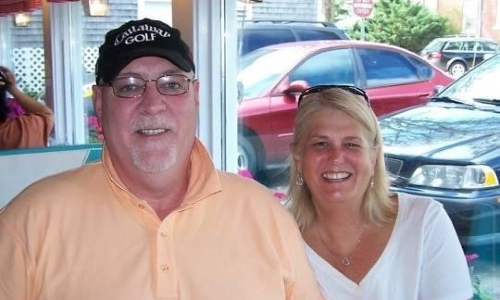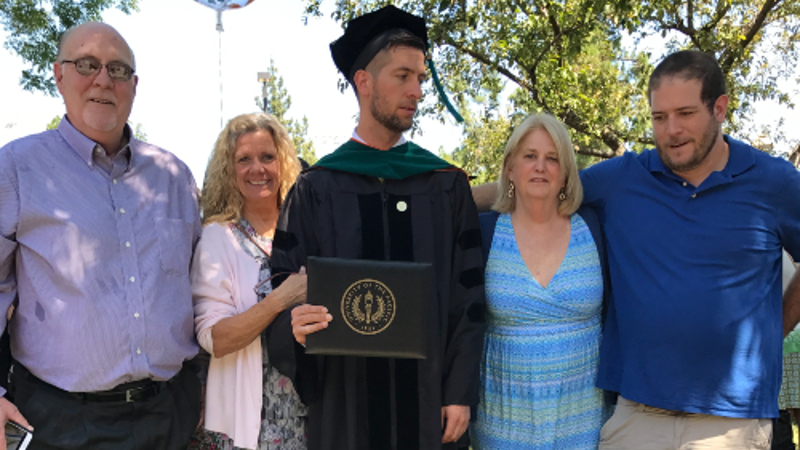Bob Riley grew up in Brookline, MA and started playing tackle football at age 10 before a brief stint in the NFL and later in the CFL. Riley suffered with his mental health for much of his adult life, before his symptoms accelerated in 2018 when he was in his mid-60s. He became increasingly depressed, verbally abusive to his wife Judy, and reclusive. On December 21, 2020, Riley passed away at age 69. He had always wanted his brain studied after death, and researchers at the UNITE Brain Bank diagnosed him with Chronic Traumatic Encephalopathy (CTE). Judy is sharing her husband’s story to detail how CTE affected Bob and to advocate against youth tackle football.

Loving Husband, Father, and Brother
Our Story
I actually met Bob at St. Elizabeth’s Hospital in Brighton, MA – we were in the nursery together! Back in those days, women stayed in the hospital for a few days after giving birth. I was born on May 4, 1951 and Bob was born May 6, 1951. Curt Gowdy Jr., son of the great sportscaster for the Boston Red Sox back in the day, was also in the nursery with us.
Bob and I felt that it was destiny when we later met as adults! We were 42 at the time and Bob’s roommate was running for Secretary of State in MA and we were both at a fundraiser for him. My friend, who brought me to the event, introduced us and when I shook Bob’s hand a voice in my head told me “this is the man you are going to marry.” Bob said “hello” and then said “I think I know you” – we had only met in the nursery, and I had not met him after that! He invited me to his birthday dinner with a bunch of friends and we sat next to each other trying to figure out where we had met. We were born two days apart and figured out that we had met in the nursery and with his natural sense of humor he said, “You were that little girl next to me that kept crying, I remember now.”
We became friends and he became my financial advisor. He was a MetLife representative and helped me invest some money and start a disability insurance policy for my telecommunication consulting firm that I started. We were friends and always called each other on our birthdays. He then moved to Colorado to be near his two sons and was there for three years. In that third year of being in Colorado, he called me on my birthday but I was in San Francisco celebrating with one of my best friends. I returned his call and said I would call him back when I got home. That summer, we started to speak more frequently until we were actually speaking every day. He was home sick and felt that his life in Colorado was coming to an end. He said he wanted to see me and we ended up FINALLY syncing our schedules.
Our first date was on Saturday, October 17, 1998. We planned on playing golf and he showed up at my house with a huge bouquet of flowers! Once again, my heart skipped a beat. We played golf and went back to my house. I had moved my dad into my house, as my dad was getting up there in age and I wanted to make sure I was there for him. When Bob and I got home, my dad had some kind of allergic reaction and I had to bring him to the hospital. I figured our “date” was over, but Bob insisted that he come to the hospital with us and stayed with me until my dad got released a few hours later. That’s the kind of man Bob was! My dad felt bad and said dinner was on him and Bob and I went out and bought lobsters, came home, cooked, and the three of us ate dinner! So my first date included my dad too, but it was wonderful for the three of us.
Bob and I went out to lunch that Monday – he came to see me at my client’s location and took me out. I think we both knew that this was IT! I then travelled to Colorado on November 6 to see him and meet his kids – what a whirlwind weekend! He then packed his car and drove back to Massachusetts on December 5. The night before his trip, he was coaching his sons’ hockey game and tripped on a puck and smashed his head on the ice – this was his eighth serious concussion! More of that later. We got engaged on March 20, 2000 and were married on October 28, 2000! It was a fun wedding!

Bob’s History
Bob came from Brookline, MA. He was always a big kid and LOVED all sports. He went to the Brookline pool after school and, of course, played town football starting at age 10. Bob continued to play and in high school he made the All-American team. He was inducted into the Brookline Hall of Fame in 2005. That was a great night and I was so proud. He gave a great speech and had many friends there to cheer him on.
After high school, he was recruited by many colleges and spent his first year at Idaho State University on a football scholarship. He was homesick and decided to come back to Massachusetts and ended up with a full financial scholarship to Northeastern University. He talked them into giving him a full “financial” scholarship and not a football scholarship – just in case he got hurt!

While playing at Northeastern, he had a severe concussion and was in the hospital on Saturday afternoon. He remained in the hospital until Thursday and then went to practice and did a walk through with the team. He then played again on Saturday and landed back in the hospital for the same concussion. Thank God NCAA rules have changed and that would NEVER happen now! Bob left school before he graduated and tried out for the Atlanta Falcons. He was cut right before the season started. He then went to the CFL and played for the Hamilton Tiger-Cats for four years.
He told me that he remembers having eight severe concussions over the years – two of which I have mentioned.
Bob’s CTE
Bob was a big guy with a bigger heart – it’s why I married him! He was very outgoing and had lots of friends. We had some great years together. He had depression when I knew him, but he had it more or less under control. He was hospitalized right before we got married because of suicidal thoughts. He spent a week or so in the psychiatric ward and they gave him a few electroconvulsive therapy (ECT) treatments which he did not like because they affected his memory. I remember when he would come out of ECT he would look at me with so much love but had no idea who I was for a few minutes. Despite his temporary delusion, he knew I was something special to him. We talked about calling off the wedding, but he said spending the rest of his life with me was the only thing he was looking forward to so we proceeded.
Things started to take a turn in 2018. He was getting more depressed, and the medications were not working. We looked into changing medications which would help for a while but nothing was sustainable. As time went on, he was staying in bed and for the last year of his life he was in bed about 23 hours a day and would only come out to eat dinner. During the last year, he was getting verbally abusive towards me, which was very hard. I had spoken with his primary care physician at MGH, Dr. Harry Shapiro, and we had discussed that Bob probably had CTE but nothing could be diagnosed until post-mortem. Dr. Shapiro was a great resource for me and Bob and I credit him for all that he did for Bob (and me). I spoke to Dr. Shapiro the day after Bob passed and we spoke for about an hour. He was a great comfort to me.
Back in May of 2020, things were getting very bad, and his verbal abuse was becoming worse. We made the decision that we would get a divorce and he would move back to Colorado to be near his sons. I was at the point of getting fearful of his behavior and did not want anything to turn into physical abuse. Bob would never hurt a fly and would absolutely NEVER hurt me – but this was no longer the Bob that I knew.
We celebrated our 20th wedding anniversary on October 28, 2020 with champagne and lobster. We toasted each other. On October 29, I drove him to the airport for his last journey to Colorado. He developed a new view of life and was looking forward to spending time with his sons and getting back into shape to be able to play some golf and be more active. This made me extremely happy. I wanted him to have this new outlook on life and was willing to let him go. We spoke about four times a day and had gotten back our relationship, which made us both very happy.

After a few weeks in Colorado, his depression started again – he was living in an independent facility and there was a COVID outbreak and he had to be isolated in his apartment. They would bring him food but he needed the socialization. He was starting to talk about suicide again which was so hard to hear. I told him to hang on and he kept saying he wasn’t going to be alive much longer. I was so afraid that he would take his life. He did not take his life but died of a massive heart attack on the night of December 21, 2020.
I will always miss him but know that he is in a better place and no longer in pain and suffering.
When I wrote Dr. Shapiro about Bob’s pathology results – he again got back to me. I would like to share what he wrote:
Hi Judy,
It was good to hear from you! Sorry to take so long to respond but I was away on vacation last week.
Thanks for sharing the pathology results with me. It’s a huge vindication for Bob!! Now we can say with certainty that many aspects of his personality and behavior later in his life were truly beyond his comprehension and control, in spite of which he still tried so hard to keep it together. I’ll always feel that ‘underneath’ the CTE was a truly wonderful human being! I’m glad I knew him and it was a real honor to be his doctor!
Harry Shapiro
This letter truly helps in my healing. Bob could no longer control his behavior. I remember Bob telling me that he could feel his brain oozing and couldn’t stop it. It was heartbreaking to know that I could not help him. I had to sit and watch his deterioration.
In life, Bob was on his own crusade to tell parents not to let their kids play football. He would also tell everyone how he had already signed papers to donate his brain to the UNITE Brain Bank. He would want me to carry on his mission and I will continue to do this.
Suicide is preventable and help is available. If you are concerned that someone in your life may be suicidal, the five #BeThe1To steps are simple actions anyone can take to help someone in crisis. If you are struggling to cope and would like some emotional support, call the Suicide & Crisis Lifeline at 988 to connect with a trained counselor. It’s free, confidential, and available to everyone in the United States. You do not have to be suicidal to call. If you’re not comfortable talking on the phone, consider using the Lifeline Crisis Chat at 988lifeline.org/chat.
Are you or someone you know struggling with lingering concussion symptoms? We support patients and families through the CLF HelpLine, providing personalized help to those struggling with the outcomes of brain injury. Submit your request today and a dedicated member of the Concussion Legacy Foundation team will be happy to assist you.

